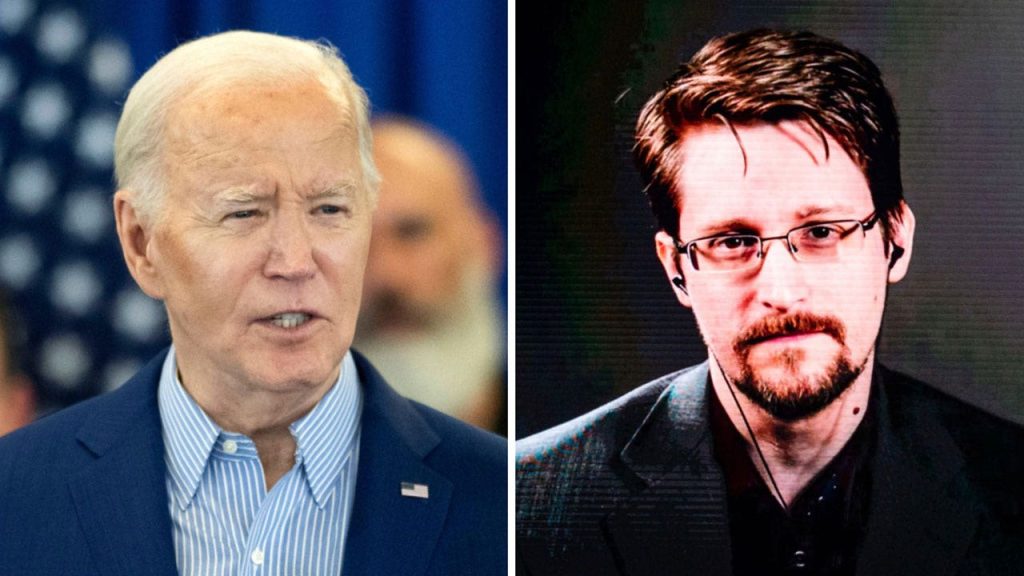Whistleblower Edward Snowden is urging President Joe Biden to veto the renewal of Section 702 of the Foreign Intelligence Surveillance Act (FISA) after the Senate’s approval of the re-authorization. Snowden criticized the House and Senate for passing what he called unconstitutional, warrantless searches of Americans’ communications. Section 702 is used by the government to collect intelligence on foreign targets through the assistance of electronic communication service providers. The measure is now awaiting Biden’s signature, with Attorney General Merrick Garland emphasizing its importance in protecting Americans from various threats.
Despite brief expiration, the Senate voted 60-34 to re-authorize Section 702 after it lapsed for less than an hour at midnight on Friday. Bipartisan opinions have surfaced regarding the necessity of the provision, with some arguing for its importance in national security efforts while others express concerns about its potential violations of constitutional rights. Various senators proposed amendments to the bill prior to its final consideration, but none garnered enough support and were not included in the re-authorization. Snowden’s call for Biden to veto the renewal reflects ongoing debates surrounding the balance between national security measures and individual freedoms.
Amendments put forth by Senators Rand Paul, Roger Marshall, Ron Wyden, Josh Hawley, Mike Lee, and Dick Durbin aimed to address concerns about FISA overreach and protect civil liberties while maintaining national security. However, these amendments were voted down, leading to the passage of the re-authorization bill without additional changes. The House of Representatives had previously passed the bill, highlighting the challenges faced by Speaker Mike Johnson in balancing privacy concerns with national security imperatives. The complex nature of FISA and Section 702 reveals ongoing debates within Congress and the public about the appropriate balance between security measures and constitutional rights.
Snowden’s advocacy for Biden to veto the renewal of Section 702 reflects broader concerns about government surveillance and potential violations of privacy rights. The importance of intelligence-gathering tools like FISA in protecting against terrorism, cyber threats, and other dangers is acknowledged by proponents of the measure, including Attorney General Garland. However, critics like Snowden and some lawmakers emphasize the need for safeguards to prevent abuses and ensure the protection of civil liberties. The Senate’s decision to re-authorize Section 702 without amendments highlights the challenges in finding a balance between security needs and individual freedoms within the realm of national intelligence efforts.
The Senate’s approval of the renewal of Section 702 of FISA demonstrates the government’s commitment to utilizing surveillance tools for national security purposes. The immediate re-authorization of the provision following a brief lapse underscores its importance in collecting intelligence on foreign threats. While concerns about potential constitutional violations persist, the Senate’s decision to pass the measure without additional amendments reflects the prevailing view among lawmakers that the benefits of the provision outweigh its drawbacks. The ongoing debates over FISA and Section 702 highlight the complexities involved in striking a balance between security measures and individual rights in the modern era of intelligence gathering.
Overall, the re-authorization of Section 702 of FISA represents a contentious issue with diverse perspectives within Congress and the broader public. Snowden’s call for Biden to veto the renewal reflects ongoing concerns about privacy rights and potential government overreach in surveillance efforts. The Senate’s decision to pass the re-authorization despite proposed amendments emphasizes the importance placed on national security measures, even as questions about constitutional protections and civil liberties remain. The debates surrounding FISA and Section 702 underscore the challenges in navigating the complex landscape of intelligence gathering and ensuring the appropriate balance between security imperatives and individual freedoms in a democratic society.













